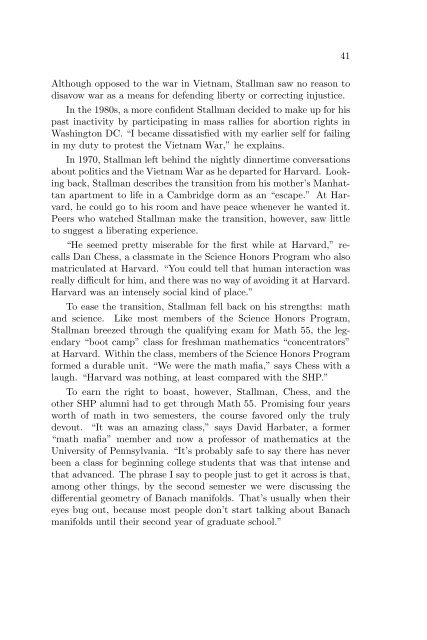Create successful ePaper yourself
Turn your PDF publications into a flip-book with our unique Google optimized e-Paper software.
Although opposed to the war in Vietnam, Stallman saw no reason to<br />
disavow war as a means for defending liberty or correcting injustice.<br />
In the 1980s, a more confident Stallman decided to make up for his<br />
past inactivity by participating in mass rallies for abortion rights in<br />
Washington DC. “I became dissatisfied with my earlier self for failing<br />
in my duty to protest the Vietnam War,” he explains.<br />
In 1970, Stallman left behind the nightly dinnertime conversations<br />
about politics and the Vietnam War as he departed for Harvard. Looking<br />
back, Stallman describes the transition from his mother’s Manhattan<br />
apartment to life in a Cambridge dorm as an “escape.” At Harvard,<br />
he could go to his room and have peace whenever he wanted it.<br />
Peers who watched Stallman make the transition, however, saw little<br />
to suggest a liberating experience.<br />
“He seemed pretty miserable for the first while at Harvard,” recalls<br />
Dan Chess, a classmate in the Science Honors Program who also<br />
matriculated at Harvard. “You could tell that human interaction was<br />
really difficult for him, and there was no way of avoiding it at Harvard.<br />
Harvard was an intensely social kind of place.”<br />
To ease the transition, Stallman fell back on his strengths: math<br />
and science. Like most members of the Science Honors Program,<br />
Stallman breezed through the qualifying exam for Math 55, the legendary<br />
“boot camp” class for freshman mathematics “concentrators”<br />
at Harvard. Within the class, members of the Science Honors Program<br />
formed a durable unit. “We were the math mafia,” says Chess with a<br />
laugh. “Harvard was nothing, at least compared with the SHP.”<br />
To earn the right to boast, however, Stallman, Chess, and the<br />
other SHP alumni had to get through Math 55. Promising four years<br />
worth of math in two semesters, the course favored only the truly<br />
devout. “It was an amazing class,” says David Harbater, a former<br />
“math mafia” member and now a professor of mathematics at the<br />
University of Pennsylvania. “It’s probably safe to say there has never<br />
been a class for beginning college students that was that intense and<br />
that advanced. The phrase I say to people just to get it across is that,<br />
among other things, by the second semester we were discussing the<br />
differential geometry of Banach manifolds. That’s usually when their<br />
eyes bug out, because most people don’t start talking about Banach<br />
manifolds until their second year of graduate school.”<br />
41


